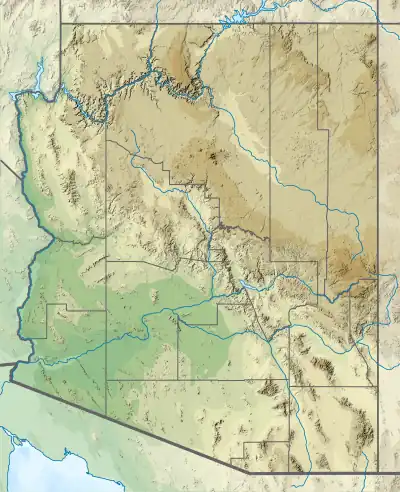San Carlos volcanic field
San Carlos volcanic field is a monogenetic volcanic field in the U.S. state of Arizona. The field lies within the San Carlos Apache Reservation about 40 km (25 mi) east of Globe, Arizona. It is a small field covering approximately 50 km2 or less of volcanic cones and lava flows. The basanite to hawaiite basaltic flows contain xenoliths of peridotite. The Peridot Mesa vent is noted for the occurrence of quantities of gem quality peridot found within lherzolite xenolith nodules.[1]
| San Carlos Volcanic Field | |
|---|---|
 San Carlos Volcanic Field | |
| Highest point | |
| Elevation | 1,000 m (3,300 ft)[1] |
| Coordinates | 33°15′N 110°15′W[1] |
| Geography | |
| Location | Arizona, United States |
| Geology | |
| Age of rock | Neogene[1] |
| Mountain type | Volcanic field[1] |
| Last eruption | ~ 1 million years ago[1] |
Notable Vents
| Name | Elevation | Coordinates | Last eruption |
|---|---|---|---|
| Aden Crater[1] | - | - | - |
| Peridot Mesa[1] | - | 33°20′02″N 110°29′08″W | - |
References
- Wood, Charles A.; Jűrgen Kienle (1993). Volcanoes of North America. Cambridge University Press. pp. 310–313. ISBN 0-521-43811-X.
This article is issued from Wikipedia. The text is licensed under Creative Commons - Attribution - Sharealike. Additional terms may apply for the media files.